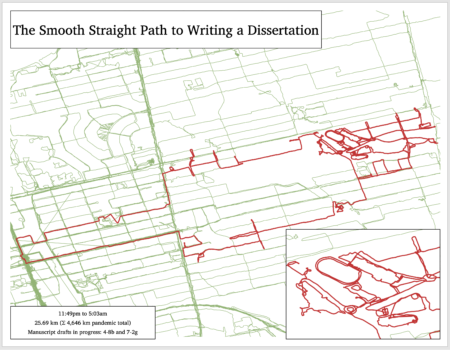Four substantive chapters make up the argument of my dissertation, covering metaphors or categories from the academic literature on contentious politics: the political opportunity structure where activists develop approaches to advance their goals; the mobilizing structures they use to choose priorities and make decisions; the repertoires of contentious actions they perform; and the framing which comprises their world view and theory of how to achieve political change.
I have written many versions of each, in drafts going back for at least a couple of years now. Continuous interaction with my advisory committee is making them more concise and focused on defending specific claims.
I had a fourth version (v4) of the thesis a couple of years ago, but it was an intolerable 700 pages and my committee members had many other comments on what was important to conclude and how to structure the argument.
A few months ago I had a sixth version (v6) available for the committee (the fifth was clean sheet rewrite which I never got far into). It was cut to about 50 pages per chapter to leave room in a standard 300 page dissertation for an introduction and conclusion.
Since then and in close consultation with my committee I have been revising the introductions to each substantive chapter — which lay out a structure and argument and explain how the content of the chapter relates to the through story of the dissertation. With a round or two of meetings or comments we revise an introduction, then I redraft the rest of the chapter based on the largely-formed raw material of v6.
Tonight I sent the revised version of the repertoires chapter, which along with political opportunity and mobilizing structures (which they have already seen and told me to proceed from) will comprise 3/4 of the main text.
I have been very grateful for an enormous amount of sympathy, aid, and support from family members and friends. The whole PhD experience has been shaped by the people who I have been fortunate enough to be close with over these years. Your aid has been indispensable throughout this process of coming up with a book-size idea… and then wrenching it out of my brain as an actual book.

